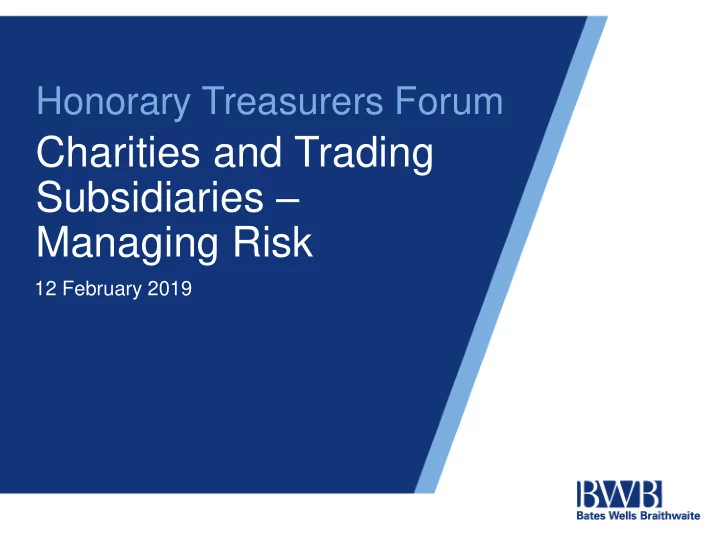

Honorary Treasurers Forum Charities and Trading Subsidiaries – Managing Risk 12 February 2019
What is a trading subsidiary? Charity Board of trustees Trading company Board of directors
Why might charities have a trading subsidiary? If it makes profits from non-primary purpose trading that come close to or exceed the small trading tax exemption limit To have a separate For tax reasons, e.g. organisation to carry gift aid on subsidiary’s out all of its trading profits activities of any kind To protect the charity’s assets from any trading losses
A charity’s ability to trade • Trade exercised in the course of carrying out a primary purpose of the charity Primary • E.g. a religious charity selling bibles, a charity which runs a school charging pupils, or a charitable clinic selling medicines purpose trading • Charity Commission guidance also includes trade mainly carried out by the charity’s beneficiaries – e.g. the manufacture and sale of items by disabled people working for a charity whose purpose is the relief of disabled persons. • Contributes indirectly to the charity’s primary purpose and is Ancillary complementary to it. • Treated in the same way as primary purpose trading trading • E.g. sale of food and drink at a restaurant of bar to audience members or a theatre charity • Trade undertaken to raise funds to be applied for charitable purposes, but which does not either directly or indirectly further Non-primary the charities purposes. • E.g. the sale of promotional items such as pens, pencils, mugs purpose trading etc. • Charity Commission guidance is that Charites can do this kind of trading where it does not involved significant risk for the charity.
Effectively Managing Risk
Clear separation between charity and subsidiary Boards of the subsidiary and charity to be aware of their duties, particularly where there is crossover between the board. Ensure sufficient number of independent trustees / directors. Charity and subsidiary to have separate board meetings, keep separate minutes and records and to ensure separate and independent decision making. Appropriate delegation in place, particularly when subsidiary will use the executive team of the charity Requisite consents and permissions in place for effective official communication, particularly between subsidiary and the charity (as its sole member) to ensure that written resolutions and other official communications are validly circulated and members resolutions are validly passed.
Directors Duties and Conflicts of Interest For trustees of the charity who are also on the subsidiary board, when deciding whether to provide support from the charity to the subsidiary Entering into contracts between the charity and the subsidiary For the board of the subsidiary, in deciding whether to reinvest profits into the subsidiary of For directors on both boards donate them to the charity in the event the subsidiary becomes insolvent or is at risk of insolvency
Directors Duties Companies Act 2006 To act within the directors’ powers s171 s172 To promote the success of the company and to act in good faith s173 To exercise independent judgement s174 To exercise reasonable care, skill and diligence s175 To avoid conflicts of interest s176 Not to accept benefits from third parties To declare interests in proposed transactions or arrangements s177
Trustees’ Duties – Charity Commission guidance
Conflicts of interest Legal duty to act in the interests of the Charity • A duty to avoid a conflict of interest situation • A duty to disclose a potential conflict of interest • A duty to manage an actual conflict of interest • Trustees should not allow their personal interests or views to override this: they must exercise independent judgment Conflicts of interest tend to arise in two forms: • where there is a potential financial or measurable benefit directly to a trustee, or indirectly through a person connected to the trustee (e.g. parents, children, siblings, companies) • where a trustee’s duty to the charity may compete with a duty or loyalty they owe to another organisation or person (generally referred to as a “ conflict of loyalty ”). Withdraw from the meeting unless expressly invited to remain Three-step approach: • Identify potential conflicts of interest • Prevent the conflict from affecting the decision • Record the conflict of interest and how it was handled
Insolvency of the subsidiary Charity Trustees : Directors : Duty to act in the best Duty switches to duty to interests of the charity, take all reasonable meaning they cannot steps owed to company’s creditors simply bail the subsidiary out rather than promoting the success for the Subsidiary company for the charity (its shareholder).
Support from the charity to the trading subsidiary Financial support: Non - financial support: Charity Back office Shares services Board of trustees Loans Use of charity’s name and Grants logo (primary purpose only) Trading company Board of directors
Payments from the subsidiary to the charity Charity Payments for: Payment Board of trustees of profits • Back from office trading, services plus gift aid • Use of charity IP Trading company Board of directors
Managing reputational risk Common directors Formal Regular licence of reporting to name and the charity logo Oversight from the charity Require Formal subsidiary to agreements have policies in place for in place all support Clawback of grant funding
Further resources Trustees trading and tax: how charities may lawfully trade (CC35) https://www.gov.uk/government/publications/trustees-trading-and-tax- how-charities-may-lawfully-trade-cc35 The Essential Trustee: What you need to know, What you need to do (CC3) https://www.gov.uk/government/organisations/charity-commission Conflicts of interest: A guide for trustees (CC29) https://www.gov.uk/guidance/manage-a-conflict-of-interest-in-your-charity HMRC: Trading and business activities – basic principles https://www.gov.uk/government/publications/charities-detailed-guidance- notes/annex-iv-trading-and-business-activities-basic-principles Charity Governance Code https://www.charitygovernancecode.org/en/pdf
Megan Read, Solicitor Charity and Social Enterprise Department Bates Wells Braithwaite London LLP : 020 7551 7835 E-mail: m.read@bwbllp.com
Recommend
More recommend